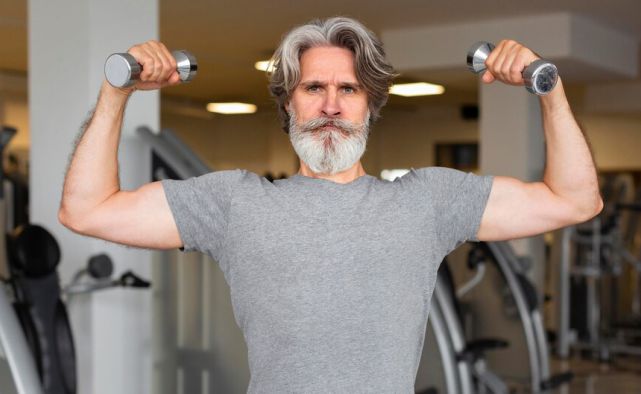Last updated on October 2nd, 2025 at 01:16 pm
Men’s health and wellness boost strength, energy, and virility, and you live longer while neglecting it leads to burnout, disease, and decline.
Men’s lifestyles and culture are fast metamorphosing, and what it means to be a man is can’t be more interesting.
Men have ab initio, were indifferent to lifestyles thought to be feminine, but information coming from health and wellness is sending warnings for men to be more receptive for their own good.
This guide covers physical fitness, nutrition, mental resilience, and lifestyle habits that keep you at your best.
Learn how to prevent common health issues, boost vitality, and build a routine that supports strength and longevity.
You might want to improve endurance, manage stress, or enhance recovery, this is your roadmap.
Take control of your well-being, avoid preventable risks, and start living stronger and longer.
Explore in-depth strategies, expert-backed advice, and actionable steps for a healthier, longer life. Your best years start with smart choices.
Recommended: Start Here for Personal Development Boost
You might want to pin the image below.

Key Takeaways:
- Prioritize regular check-ups and screenings to catch potential health problems early.
- Nutrition rich in whole foods supports energy, muscle growth, and heart health.
- Exercise regularly to improve strength, endurance, and mental clarity.
- Mental health is equally important, seek help when needed and prioritize emotional well-being.
Related: Functional Fitness Exercises for Senior Men
Why You Must Care about Men’s Health and Wellness as a Man
Your health isn’t just about avoiding sickness, it’s about strength, energy, and living on your terms.
Too many men ignore warning signs, delay checkups, and push through stress without realizing the long-term cost.
Heart disease, diabetes, and mental health struggles don’t appear overnight, they build over time.
Ignoring your well-being doesn’t just affect you; it impacts your family, career, and future.
The Silent Crisis in Men’s Health
Men are less likely to talk about health concerns or seek medical help.
Society expects toughness, but real strength comes from taking control.
Skipping checkups, eating poorly, and bottling up stress can lead to serious health issues.
High blood pressure, obesity, and depression don’t wait for the “right time” to be addressed.
Why Prevention is the Smartest Strategy
Most major health problems are preventable with the right habits. Regular exercise, a balanced diet, and stress management can keep you in top shape.
Small changes like better food choices, consistent workouts, and quality sleep, can add years to your life.
Recommended: Heatlh Screenings Men in their 50s Should Get
Physical Health: The Foundation of a Stronger Life

Your body is your greatest asset, and how you treat it today determines your strength, energy, and resilience in the years ahead.
Physical health isn’t just about looking fit, it’s keeping your heart strong, maintaining mobility, and preventing disease.
The key areas to focus on are nutrition, exercise, and preventative care.
Fuel Your Body with the Right Nutrition
What you eat directly impacts your energy levels, weight, and overall health.
A diet rich in lean proteins, healthy fats, whole grains, and fiber-packed fruits and vegetables helps maintain muscle, regulate blood sugar, and reduce the risk of heart disease.
Staying hydrated keeps your metabolism running smoothly and supports brain function.
Skipping processed foods and excessive sugar leads to fatigue, weight gain, and long-term health problems.
Stay Active to Stay Strong
Regular movement is non-negotiable for a healthy body. Strength training builds muscle and supports bone health, while cardio improves heart function and endurance.
Flexibility exercises prevent stiffness and injuries. Even a 30-minute daily workout can boost circulation, keep your weight in check, and release endorphins that fight stress and anxiety.
Sitting all day accelerates aging, so move often, whether it’s lifting weights, walking, or stretching.
Related: Older Men’s Workout Guide
Preventative Care: Catch Problems Early
Many serious health issues, high blood pressure, diabetes, and heart disease, develop silently.
Regular doctor visits, blood pressure checks, cholesterol tests, and age-appropriate screenings help catch problems before they turn into crises.
Ignoring symptoms or skipping checkups won’t make issues disappear. Taking charge now means avoiding complications later.
Your physical health is in your hands. The choices you make today determine your strength and longevity tomorrow.
Start moving, eat wisely, and stay ahead of potential health risks.
Related: Guide to Testosterone
Fitness: Why Every Man Needs to Stay Active

Men who stay active live stronger, healthier, and longer lives. Fitness is about building strength, endurance, and resilience.
Men who commit to regular exercise reduce their risk of heart disease, obesity, and muscle loss while improving energy, confidence, and mental clarity.
A solid fitness routine includes strength training, cardio, and flexibility exercises.
Strength Training: Build Muscle, Boost Metabolism
Men lose muscle mass with age, but strength training helps maintain and even build it.
Lifting weights, bodyweight exercises, and resistance bands strengthen muscles, support joint health, and improve metabolism.
Men should train all major muscle groups at least twice a week to stay strong and prevent weakness over time.
Cardio: Keep Your Heart and Body in Top Shape
Cardiovascular exercise is crucial for men’s heart health. Running, cycling, swimming, and even brisk walking keep your heart strong and lower the risk of conditions like hypertension and stroke.
Men should aim for at least 150 minutes of moderate cardio or 75 minutes of intense cardio per week. Split it into daily sessions to make it easier to stick to.
Flexibility and Mobility: Stay Injury-Free
Many men skip stretching, but flexibility improves mobility, prevents injuries, and supports recovery.
Simple yoga, dynamic stretching, and mobility drills keep joints healthy and muscles limber.
Adding a few minutes of stretching daily helps men move better and avoid stiffness.
Set Goals and Stay Consistent
Men who set clear fitness goals, whether muscle gain, fat loss, or endurance improvement, are more likely to stay committed.
Start with realistic targets and track progress. A consistent routine keeps men strong, active, and ready for anything life throws their way.
Recommended: Men’s Fitness Guide
Nutrition: What Men Need to Eat for a Healthy Life

Men’s bodies demand the right fuel to stay strong, energized, and healthy. Good diet is one of the healthy habits men should master to take control of their health.
What men eat affects muscle growth, heart health, hormone balance, and even mental sharpness.
A solid nutrition plan helps men build muscle, prevent disease, and maintain energy levels throughout the day.
Protein: The Foundation of Strength
Men who want to stay strong need high-quality protein to support muscle repair and growth.
Lean meats, eggs, fish, dairy, legumes, and nuts provide the building blocks for recovery and performance.
Men who train regularly need more protein to maintain muscle and speed up recovery.
Healthy Fats: Support Heart and Hormone Health
Fats aren’t the enemy; the right fats keep men’s hearts and hormones in check.
Avocados, olive oil, nuts, seeds, and fatty fish supply essential omega-3s, reducing inflammation and supporting testosterone production.
Avoid trans fats and processed oils that can lead to weight gain and heart disease.
Key Vitamins and Minerals for Men
Men need strong bones, optimal testosterone levels, and steady energy.
That means getting enough Vitamin D, calcium, magnesium, and zinc.
Dairy, leafy greens, nuts, and seafood provide these essential nutrients.
Low levels of these minerals can weaken bones and lower energy.
Whole Foods vs. Processed Foods
As a man, if you rely on whole foods like vegetables, whole grains, and lean proteins, you will stay healthier than those who eat processed junk.
Packaged foods are loaded with excess sugar, sodium, and artificial additives that sabotage men’s health.
Cooking at home with fresh ingredients keeps nutrition on track.
Meal Planning: A Smart Strategy for Men
Men who plan meals make better food choices. Prepping healthy meals reduces the temptation for fast food and processed snacks.
A little effort upfront leads to better long-term health, weight control, and consistent energy.
As a man, when you focus on nutrition as a daily habit, you feel stronger, think clearer, and reduce your risk of disease. Eat with purpose, and your body will thank you.
Mental Health

Men’s mental health is just as important as physical health, yet many men ignore or suppress emotional struggles.
Depression, anxiety, and stress are widespread among men, but due to societal pressures, men often feel they must stay strong and silent instead of seeking help.
This mindset can lead to serious consequences, including substance abuse, strained relationships, and a decline in overall health.
Breaking the Stigma
As a man, you were conditioned to believe that showing emotion is a sign of weakness, making it difficult to discuss mental health challenges.
However, bottling up stress and emotions only worsens mental health. You as a man need to understand that seeking help is a sign of strength, not failure.
Talking to a therapist, counselor, or support group can provide the tools to manage mental health effectively.
Strategies for Mental Wellness in Men
As a man who wants to be healthy and live long without being a burden to others, you can take proactive steps to safeguard you mental health:
- Exercise regularly: Physical activity releases endorphins, reducing stress and improving mood.
- Practice mindfulness: Meditation, deep breathing, or journaling can help men process emotions and build resilience.
- Build strong social connections: Men who open up to friends, family, or mentors about their struggles feel less isolated.
- Prioritize rest and recovery: Lack of sleep can worsen anxiety and depression, making rest a critical part of mental health.
Men Need Support, Not Silence
Mental health struggles don’t make you weak. In fact, acknowledging challenges and taking steps toward healing makes you stronger and more resilient.
By addressing mental health openly, you can break the cycle of silence, support each other, and live healthier, more fulfilling lives.
Men’s Emotional Well-being
Your emotional well-being affects every part of your life, from relationships to work performance to how you handle stress.
When you understand and manage your emotions effectively, you build mental resilience and form stronger connections with the people around you.
Why Emotional Intelligence Matters
Recognizing your emotions and understanding how they influence your actions is a skill that improves communication and decision-making.
It also helps you read the emotions of others, making interactions smoother and more meaningful.
Emotional intelligence isn’t about suppressing feelings. It’s about acknowledging them without letting them take control.
Instead of reacting impulsively, you pause, process, and respond in a way that aligns with your values and goals.
Building Stronger Connections
The quality of your relationships plays a major role in emotional health.
When you surround yourself with genuine, supportive people, you create a network that helps you handle life’s ups and downs.
Open communication is key, when you express what’s on your mind, you strengthen trust and deepen connections.
It’s not just about talking but also about listening with intention.
Paying attention to what others say, without planning your response while they speak, shows that you value their thoughts.
It also sharpens your ability to pick up on unspoken emotions, which can help prevent misunderstandings and unnecessary conflict.
Managing Stress and Negative Emotions
Bottling up stress leads to burnout, anger, or even depression. Instead of ignoring what you’re feeling, develop habits that help you healthily process emotions.
Here are a few strategies:
- Physical movement: Exercise isn’t just for your body; it’s a natural stress reliever that clears your mind.
- Mindfulness and meditation: Taking a few minutes to breathe deeply and focus on the present can shift your mindset.
- Journaling: Writing down thoughts and emotions helps you make sense of them instead of letting them build up.
- Healthy distractions: Reading, listening to music, or engaging in hobbies can redirect your mind and offer clarity.
Turning Awareness into Action
Emotional well-being isn’t about achieving a perfect state of calm but handling challenges without letting them consume you.
When you prioritize self-awareness, open communication, and stress management, you put yourself in control of your mental and emotional strength.
Small daily choices, like expressing gratitude, checking in with your emotions, and maintaining supportive relationships, can create lasting change.
The more you practice, the easier it becomes to handle life with clarity and confidence.
Preventative Care: Staying Ahead of Health Risks

Taking care of your health isn’t just about reacting to problems, it’s about preventing them before they start.
Regular check-ups and screenings help catch potential issues early, giving you a better chance at long-term wellness.
Health Screenings in Your 20s and 30s
At this stage, you might feel invincible, but building good habits now sets the foundation for a healthier future.
Routine check-ups should include:
- Blood pressure and cholesterol tests: High levels can lead to heart disease if left unchecked.
- STI screenings: Regular testing ensures early detection and treatment.
- Vaccinations: Staying up to date on flu shots and the HPV vaccine protects against preventable diseases.
Developing a strong relationship with a healthcare provider now makes it easier to track changes in your health over time.
Preventative Care in Your 40s and 50s
As you get older, certain screenings become more important. Health risks increase, so regular monitoring can help you stay ahead of potential problems.
Key screenings include:
- Prostate-specific antigen (PSA) test: Helps detect prostate cancer early.
- Colorectal cancer screening: Recommended starting at age 45.
- Diabetes screening: Early detection can prevent complications.
- Heart health monitoring: Blood pressure, cholesterol, and lifestyle habits all play a role.
This is also a good time to evaluate lifestyle choices, including diet, exercise, and stress management, to keep your body in top shape.
Health Priorities in Your 60s and Beyond
Aging brings new health concerns, making regular check-ups even more important.
At this stage, focus on:
- Vision and hearing tests: Early intervention can slow deterioration.
- Continued cancer screenings: Prostate and colorectal cancer remain key concerns.
- Bone density tests: Helps assess the risk of osteoporosis.
- Vaccinations: Pneumococcal and shingles vaccines reduce the risk of serious infections.
Preventative care doesn’t just add years to your life, it adds quality to those years.
Taking Control of Your Health
Making regular health check-ups a priority keeps you in control of your well-being.
Small steps, like scheduling screenings, staying active, and maintaining a balanced diet, can prevent bigger health issues down the road.
Your future self will thank you for the choices you make today.
Lifestyle Choices: Shaping Your Health for the Long-Term
The choices you make every day directly impact your health. Whether it’s what you eat, how you manage stress or the way you sleep, these factors play a huge role in your overall well-being.
By making informed decisions, you can improve not only your quality of life but also your long-term health.
Let’s take a closer look:
Substance Use: Moderation is Key
Excessive use of substances like alcohol and tobacco can take a serious toll on your health.
Heavy drinking increases the risk of liver disease and hypertension, while smoking is linked to lung disease and several cancers.
To protect your health, consider:
- Moderating alcohol intake: Stick to the recommended guidelines.
- Quitting smoking: Seek support or use nicotine replacements.
- Exploring healthier habits: Physical activity, mindfulness, or hobbies can help reduce the urge to rely on substances for stress relief.
By cutting back on harmful substances, you lower your risk for serious health conditions and improve your overall wellness.
Sleep Hygiene: Prioritize Rest for Optimal Health
Getting enough quality sleep is essential for both physical and mental health.
Sleep impacts everything from your mood to your immune system. To improve sleep hygiene:
- Aim for 7-9 hours of sleep each night: Establish a consistent sleep schedule.
- Create a sleep-friendly environment: Keep your room cool, dark, and quiet.
- Limit screen time before bed: Blue light from devices can interfere with your ability to fall asleep.
Good sleep enhances your mood, cognitive function, and energy levels, helping you stay productive and focused during the day. More on the men’s sleep guide.
Stress Management: Find Balance and Relax
Chronic stress can take a toll on both your body and mind. It’s linked to heart disease, anxiety, and other serious health issues.
To keep stress in check, consider these methods:
- Practice deep breathing exercises or meditation: Simple techniques can calm your mind.
- Stay active: Physical exercise reduces stress hormones and boosts mood.
- Connect with loved ones: Strong social connections offer emotional support and help relieve stress.
By managing stress effectively, you can protect both your mental and physical health.
Living a Balanced Life
Making the right lifestyle choices is a simple yet powerful way to boost your health.
Moderating substances, improving your sleep habits, and managing stress are all within your control.
Start small, make gradual changes, and you’ll see positive results in your physical, mental, and emotional well-being.
Conclusion
In this comprehensive guide on men’s health and wellness, we have discussed various important areas that contribute to a fulfilling and healthy life for men.
Men’s health is integral to living a long, strong, and fulfilling life. Taking charge of your physical fitness, nutrition, mental health, and preventative care is the best way to ensure vitality, longevity, and happiness.
By adopting a proactive approach to self-care, you as a man can reduce the risks of chronic diseases and maintain your strength and energy well into your later years.
Start making small, sustainable changes today to build a healthier future for tomorrow.
Don’t wait for illness to strike, act now for a stronger, more resilient you.
References:
- https://valleywisehealth.org/blog/ultimate-mens-health-guide-tips-improve-your-life/
- Recent Scientific Paper
- Fitness Nutrition Tips for Men
Pyo Merez is a men’s lifestyle enthusiast and writer about the gentleman’s place and impact on society. Raised by a distinguished gentleman dad, he offers unique insights into how the mind of a gentleman works and how societal norms shape gentlemen’s identity and vice versa.
Through his insightful articles, Pyo taps into the depths of gentleman culture to provide perspectives on etiquette and manners in modern society.

